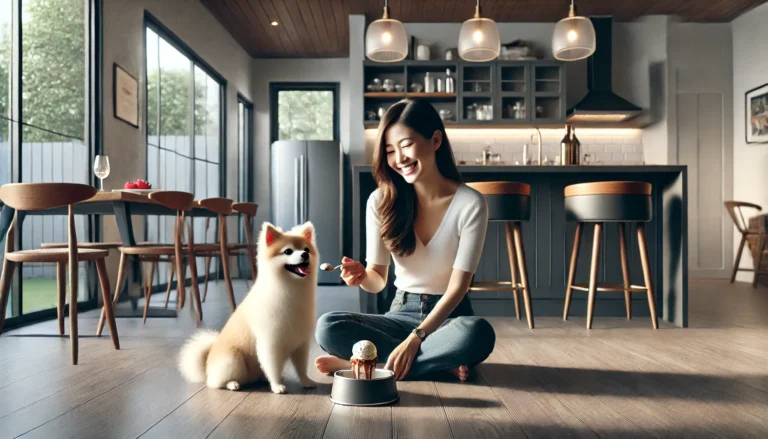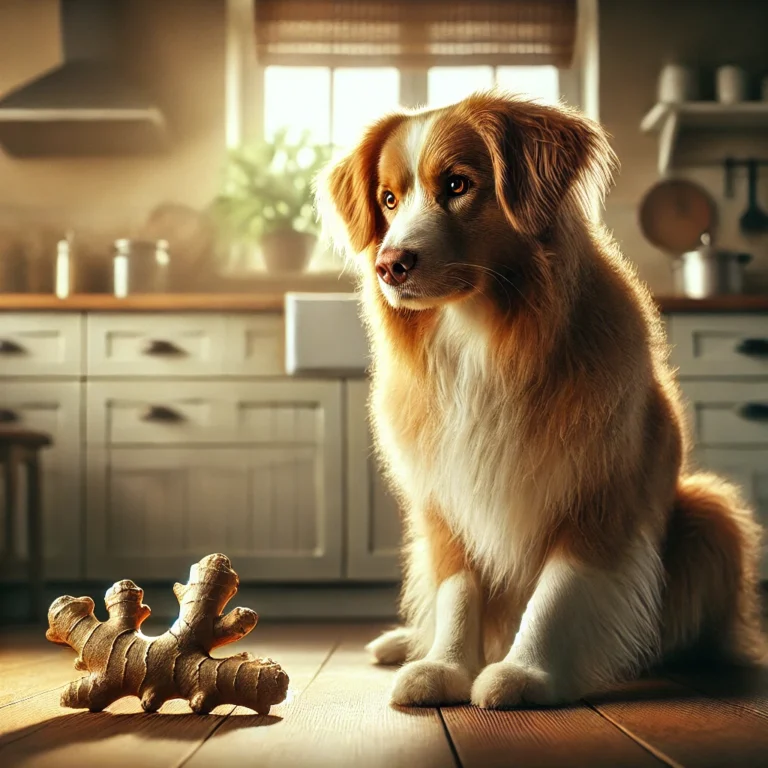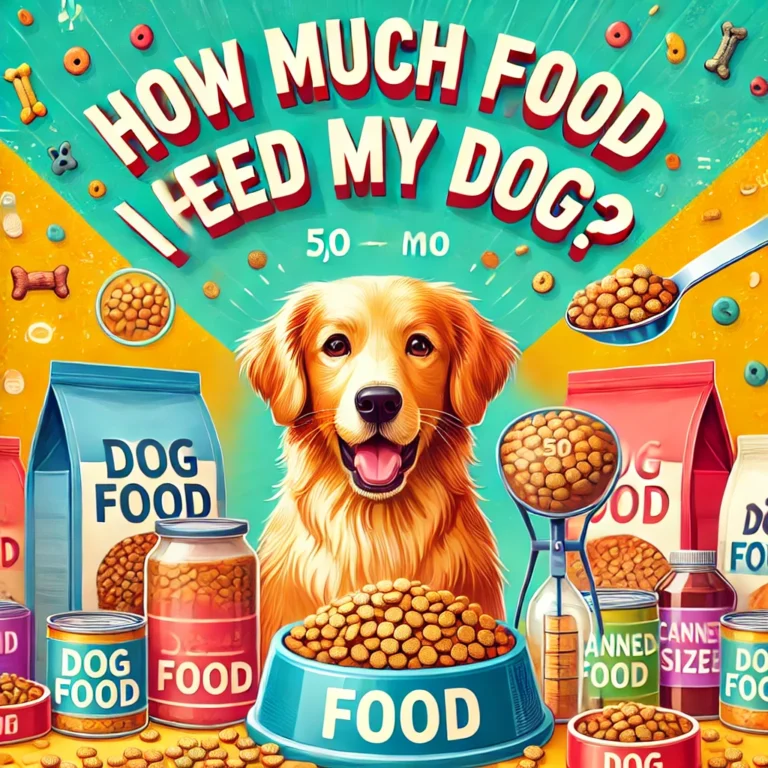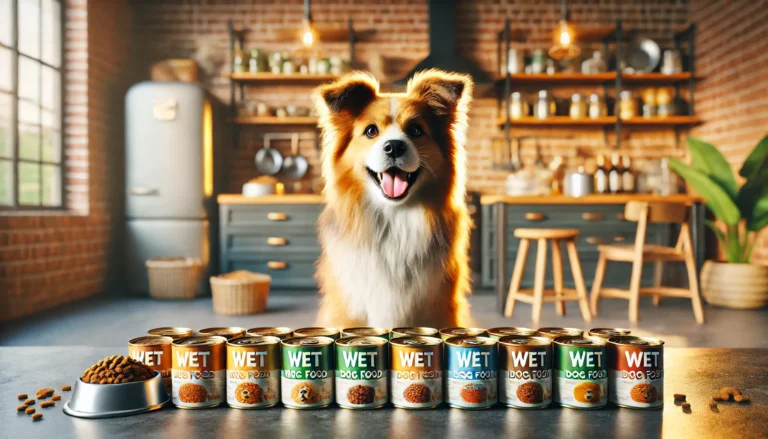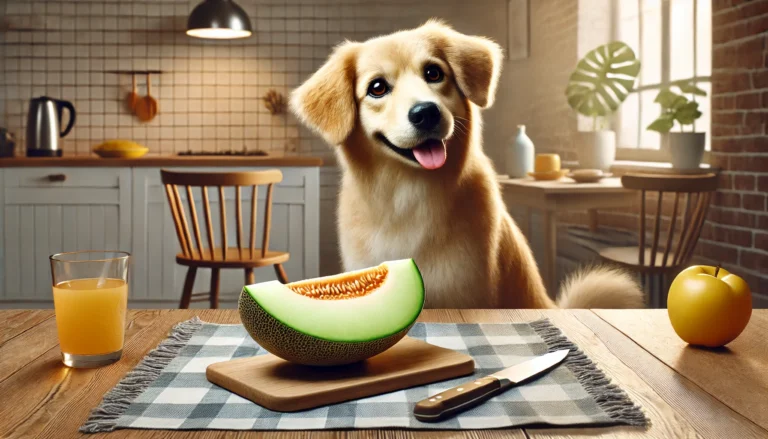can my dog have carrots?

Many dog owners ask, “Can my dog have carrots?” Carrots are popular treats for dogs, packed with vitamins and minerals beneficial to their health. This article will dive into all aspects of feeding carrots to dogs, including the benefits, nutrition, safe preparation methods, and tips to answer every question on whether your dog can have carrots in various forms like frozen, boiled, or raw.

Nutritional Profile of Carrots for Dogs
Can my dog have carrots? Yes, indeed. Carrots bring several benefits to a dog’s diet. Here’s what they offer in terms of nutrients:
- Vitamin A: Essential for vision and immune function.
- Fiber: Supports digestion and prevents constipation.
- Beta-Carotene: A precursor to Vitamin A, helpful in maintaining eye health.
- Minerals: Including potassium, necessary for muscle and nerve function.
Table: Nutritional Content of Carrots
| Nutrient | Amount per 100g |
|---|---|
| Calories | 41 |
| Water | 88% |
| Protein | 0.9g |
| Carbs | 9.6g |
| Fiber | 2.8g |
| Sugar | 4.7g |
| Vitamin A | 835 µg |
| Vitamin K | 13.2 µg |
| Vitamin C | 5.9 mg |
| Iron | 0.3 mg |
| Potassium | 320 mg |
Do you know?
With the passage of time, fluffy dogs are gaining popularity to be a great pet amid their loyalty and beauty.
Health Benefits answering ‘Can my dog have carrots?’
- Supports Dental Health: Chewing raw carrots can naturally clean a dog’s teeth and reduce plaque buildup.
- Boosts Eye Health: Carrots are high in beta-carotene, which is essential for eyesight.
- Immune Support: Antioxidants in carrots help support the immune system.
- Good Fiber Source: The fiber in carrots can prevent diarrhea and promote regular bowel movements.
- Weight Management: Carrots are low-calorie treats, helping dogs maintain a healthy weight.
Serving Carrots to Dogs: Raw, Cooked, or Frozen?
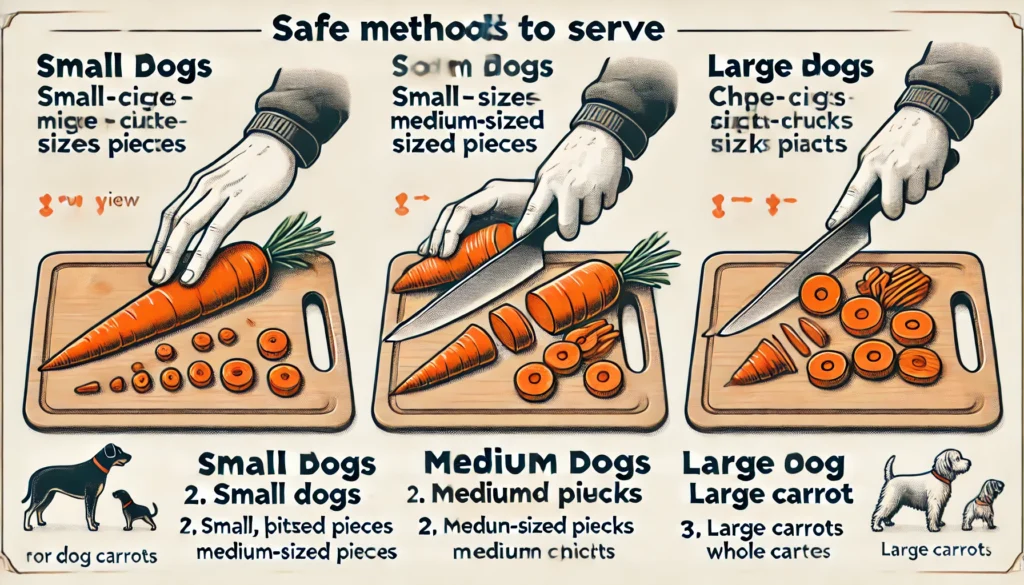
Raw Carrots
Many dog owners wonder, “Can my dog have carrots raw?” Yes, dogs can enjoy raw carrots safely. They are especially popular for dental health benefits. However, they should be sliced into bite-sized pieces to avoid choking hazards.
Cooked Carrots
Some dog owners prefer boiled or steamed carrots, as they’re softer and easier to digest, especially for puppies or senior dogs. Cooking carrots can slightly reduce their nutritional content, specifically Vitamin C and fiber levels. Here’s how to prepare carrots for dogs:
- Boiled or Steamed: Cook carrots until they’re tender.
- Mashing: Mash the cooked carrots to mix with dog food.
Frozen Carrots
Can dogs eat frozen carrots? Yes, many dogs enjoy frozen carrots as a cooling treat, especially in summer. For teething puppies, frozen carrots can offer relief for sore gums.
Comparative Analysis: Raw vs. Cooked Carrots
| Nutrient | Raw Carrots Availability (%) | Cooked Carrots Availability (%) |
|---|---|---|
| Vitamin A | 100 | 80 |
| Vitamin K | 100 | 95 |
| Vitamin C | 100 | 70 |
| Fiber | 100 | 90 |
| Potassium | 100 | 95 |
This table shows that cooking reduces some nutrients in carrots, though they remain a healthy snack for dogs.
Precautions When Feeding Carrots to Dogs
- Choking Hazard: Always cut carrots into appropriate sizes based on your dog’s size.
- Moderation: Too many carrots could result in digestive upset.
- Watch for Allergies: Rarely, dogs may be allergic to carrots.
Conclusion on can my dog have carrots
Carrots are a nutritious addition to a dog’s diet, whether raw, cooked, or frozen. They can offer several benefits, from improving vision to promoting dental health. Always consult your veterinarian if you have questions about introducing new foods into your dog’s diet, especially if you’re considering carrots as a regular treat.
1. Can dogs eat carrots raw?
Yes, dogs can safely eat raw carrots. They are rich in nutrients like fiber, beta-carotene, and vitamin A, which are beneficial to your dog’s health. However, to avoid choking, cut the carrots into small, bite-sized pieces, especially for smaller dogs.
2. What vegetables can dogs eat?
Dogs can safely enjoy several vegetables, including carrots, green beans, broccoli, cucumber, peas, and sweet potatoes. These vegetables offer vitamins, minerals, and fiber, but they should be served in moderation and always plain, without added salt, seasonings, or sauces.
3. Do carrots clean dogs’ teeth?
Yes, chewing on raw carrots can help clean a dog’s teeth naturally. The crunchiness of carrots helps scrape off plaque and reduce tartar buildup. However, while helpful, carrots are not a substitute for regular brushing or professional dental cleanings.
4. Can I give my puppy a carrot for teething?
Yes, carrots are great for teething puppies. They offer relief from gum pain and are safe as long as they are given in small pieces. Freezing the carrot can make it even more soothing for teething puppies.
5. Can 2-month-old puppies eat raw carrots?
Yes, 2-month-old puppies can have raw carrots in small, manageable pieces. Carrots are a healthy snack and safe for young puppies as long as they are cut into bite-sized pieces to avoid choking risks.
6. Why do dogs love carrots?
Dogs often enjoy carrots because they’re naturally sweet and have a satisfying crunch. The texture and mild flavor can make carrots an appealing treat, and they offer a fun, low-calorie snack that keeps dogs engaged.
7. Are eggs good for dogs?
Yes, eggs are safe and nutritious for dogs. They provide protein, fatty acids, and vitamins, supporting skin, coat, and muscle health. Serve eggs plain, either boiled or scrambled, without seasoning, butter, or oil, and in moderation to avoid an upset stomach.
8. What veggies can dogs not eat?
Dogs should avoid onions, garlic, leeks, and chives, as these vegetables can be toxic and damage red blood cells. Additionally, mushrooms and rhubarb should be avoided due to potential toxicity risks. Always check before introducing new veggies to your dog’s diet.
9. Are bananas good for dogs?
Yes, bananas are safe for dogs and can be given in moderation. They are high in potassium, vitamin B6, and vitamin C. However, bananas are also high in sugar, so serve them as an occasional treat to avoid weight gain or blood sugar issues.

